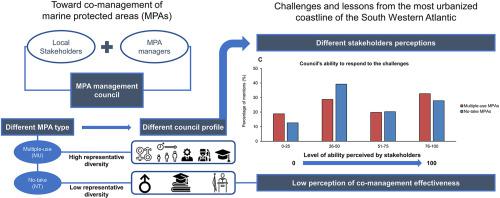Ocean & Coastal Management ( IF 4.6 ) Pub Date : 2023-12-26 , DOI: 10.1016/j.ocecoaman.2023.106972 Ivan R.A. Laurino , Marina Marconi , Heidi L. Burdett , Helen Cross , Michel J. Kaiser , Dimitris Christopoulos , Leandra Gonçalves , Fabio S. Motta , Guilherme H. Pereira-Filho

|
Marine Protected Areas (MPAs) are powerful instruments to conserve biodiversity and ecosystems, if supported by an effective management structure. In Brazil, no-take and multiple-use MPAs have advisory councils that allow co-management as an important strategy to deal with conservation challenges, mainly in urbanized coastal areas. However, the profile of members and their perceptions regarding advisory council challenges remain poorly known. Here, we assessed the advisory management councils of the largest network of MPAs in the South Western Atlantic, situated next to one of the largest metropolitan areas in the world. Seven MPA advisory councils were initially characterized through consultation with the MPA managers, followed by interviews with each advisory council member. We found that advisory council members were mostly agents of the local government, university scientists, members of local associations, and employees of non-governmental organizations. Compared with no-take MPAs, multiple-use MPAs tended to have greater diversity of member profiles in terms of institutional affiliation, gender, training level and age group. Although the majority of respondents considered the advisory councils an effective management tool, almost 30% of the interviewees did not recognize this mechanism as efficient, and the perceived capacity for advisory councils to respond to challenges was lower in no-take MPAs. This perception was attributed to a lack of complete actor inclusivity and the low decision-making power of advisory councils. There was a general agreement that no-take MPA advisory councils in particular are not achieving their sustainability goals and have progressed less than multiple-use MPAs in terms of co-management. To overcome this, we provide a series of recommendations to improve stakeholder participation and co-management of MPA operation.
中文翻译:

海洋保护区的共同管理:西南大西洋最城市化海岸线的挑战和教训
如果有有效的管理结构的支持,海洋保护区(MPA)是保护生物多样性和生态系统的有力工具。在巴西,禁止捕捞和多用途海洋保护区设有咨询委员会,允许共同管理作为应对保护挑战的重要战略,主要是在城市化沿海地区。然而,成员的概况及其对咨询委员会挑战的看法仍然鲜为人知。在这里,我们评估了西南大西洋最大的海洋保护区网络的咨询管理委员会,该网络位于世界上最大的都市区之一附近。七个 MPA 咨询委员会最初是通过与 MPA 经理协商确定的,随后采访了每位咨询委员会成员。我们发现,顾问委员会成员大多是当地政府的代理人、大学科学家、当地协会的成员以及非政府组织的雇员。与禁止使用的海洋保护区相比,多用途海洋保护区的成员在机构隶属关系、性别、培训水平和年龄组方面往往具有更大的多样性。尽管大多数受访者认为咨询委员会是一种有效的管理工具,但近 30% 的受访者并不认为这种机制有效,而且在禁止采取的海洋保护区中,咨询委员会应对挑战的能力较低。这种看法归因于缺乏完整的参与者包容性和咨询委员会的低决策权。人们普遍认为,禁止采取海洋保护区的咨询委员会尤其没有实现其可持续发展目标,并且在共同管理方面的进展低于多用途海洋保护区。为了克服这个问题,我们提供了一系列建议来改善利益相关者的参与和 MPA 运营的共同管理。



























 京公网安备 11010802027423号
京公网安备 11010802027423号